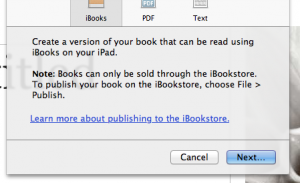Today Apple held an education-focused event where they announced a major upgrade to iBooks and iTunes U, the launch of a textbook initiative and a free OS X-only tool for creating rich, interactive iBooks called iBook Author. Apple has received both praise, and criticism for their efforts, but one criticism stands out.
Dan Weinman called attention to a clause in the iBooks EULA which prohibits creators from selling anything they generate with iBooks Author anywhere but Apple’s iBookstore (they can give the books away wherever they’d like).  This has made a lot of people upset, and brought some people to Apple’s defense.  Apple’s defenders argue that it is perfectly reasonable that their Apple’s free software not be used to make a competitor money.

That may be true, but it is hard to see this as anything but a small and petty move on Apple’s part.
My perspective is this: without this restriction in place, how likely is it that someone would use iBook Author to produce an ebook for commercial sale and NOT offer it through iBookstore, considering:
- Apple makes the best device for viewing such publications
- Apple sells more of them than everyone who makes anything remotely similar, combined
- Apple offers the best ecommerce options for selling them?
Further, and for the same reasons, how likely is it that the sales through that alternate channel would be anything but a drop in the bucket compared to what flowed through iBookstore?
If, at some future date, Apple no longer makes the best device for viewing such content and/or, has serious competition for market share of iPad-class devices, and/or doesn’t have the best commerce system, then creators will have plenty of incentive to recreate their publications in order to get around this restriction anyway.
In the end, I think the ill-feelings this restriction creates is more costly than any additional value it might help Apple capture.